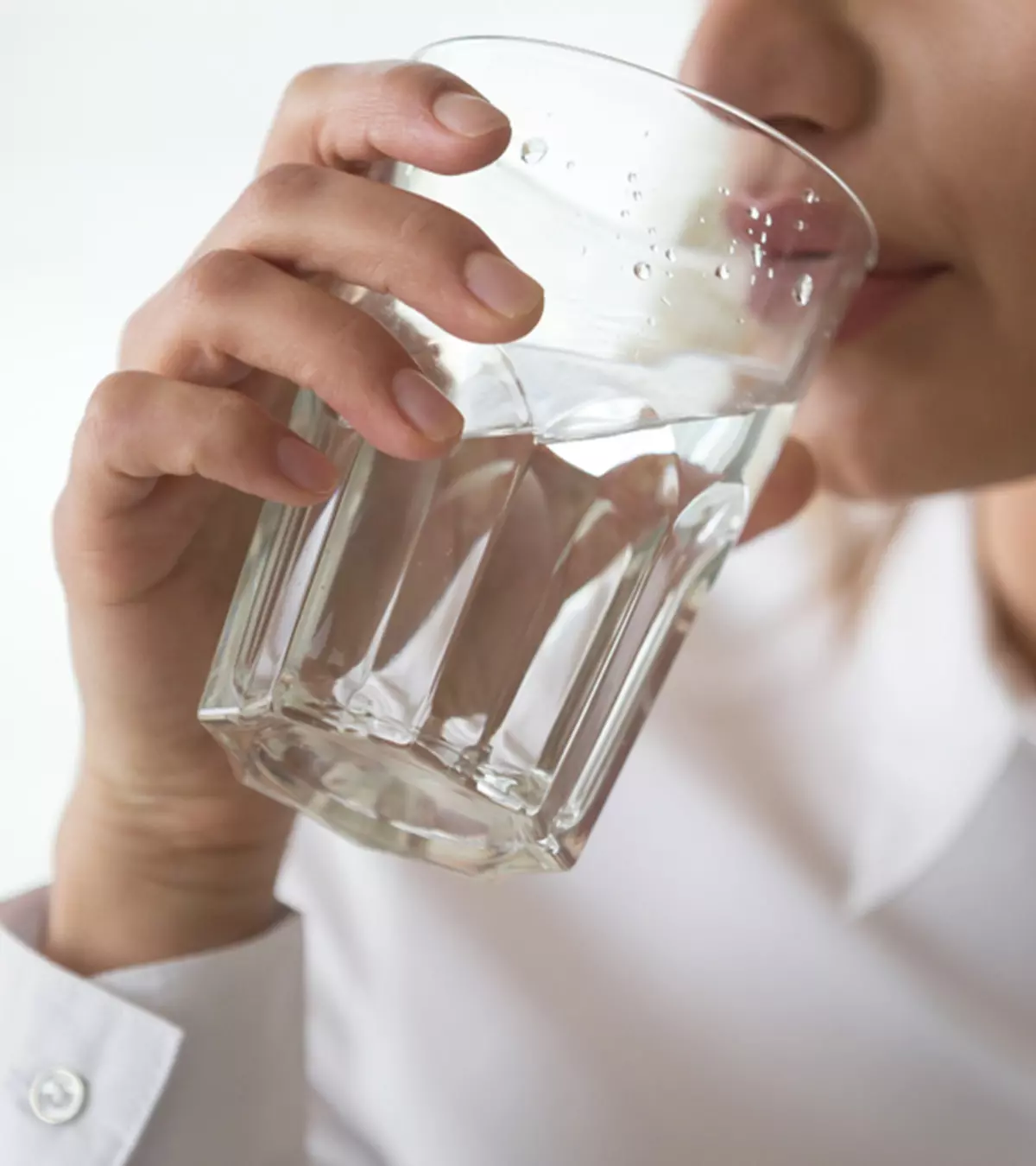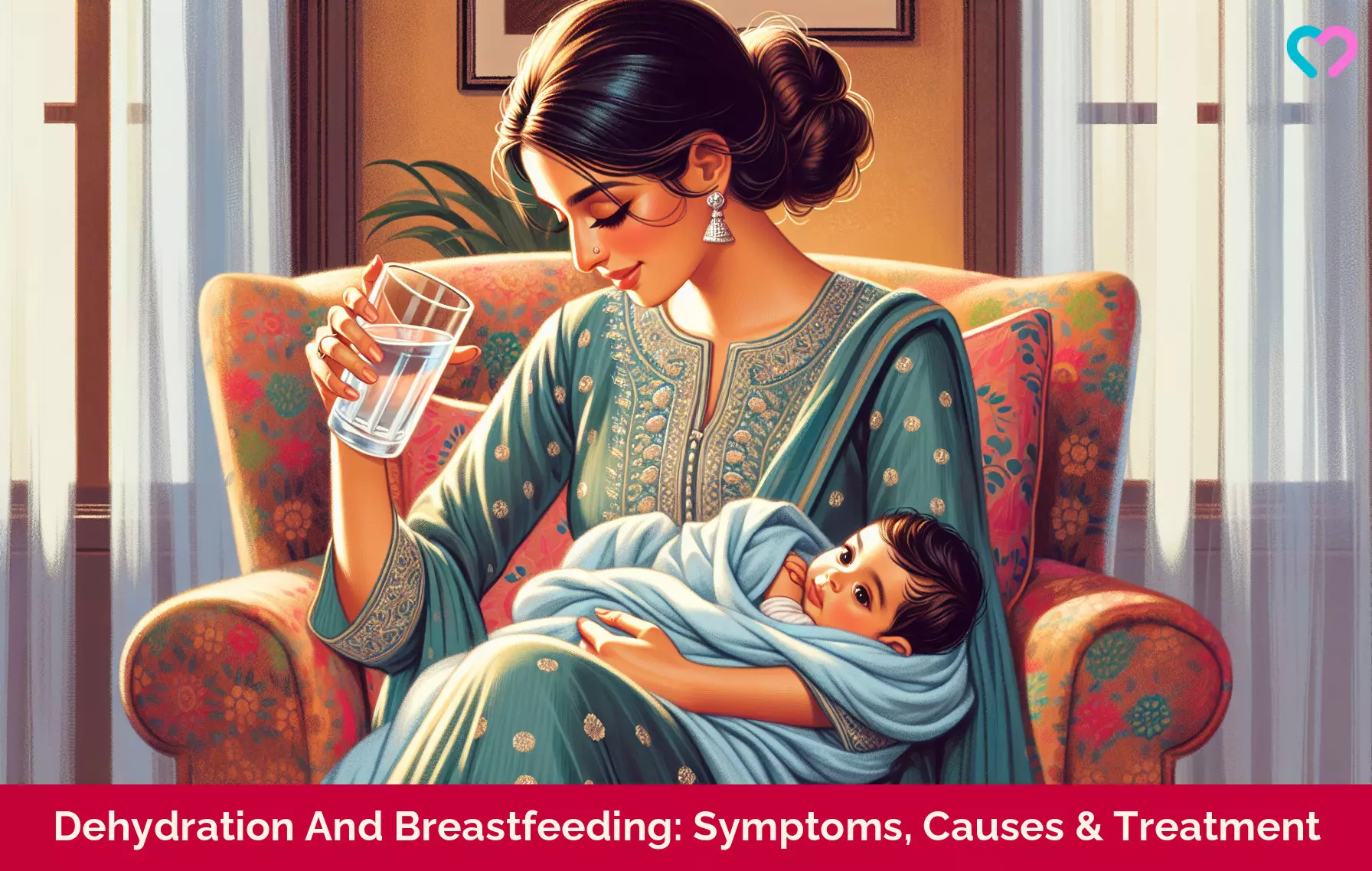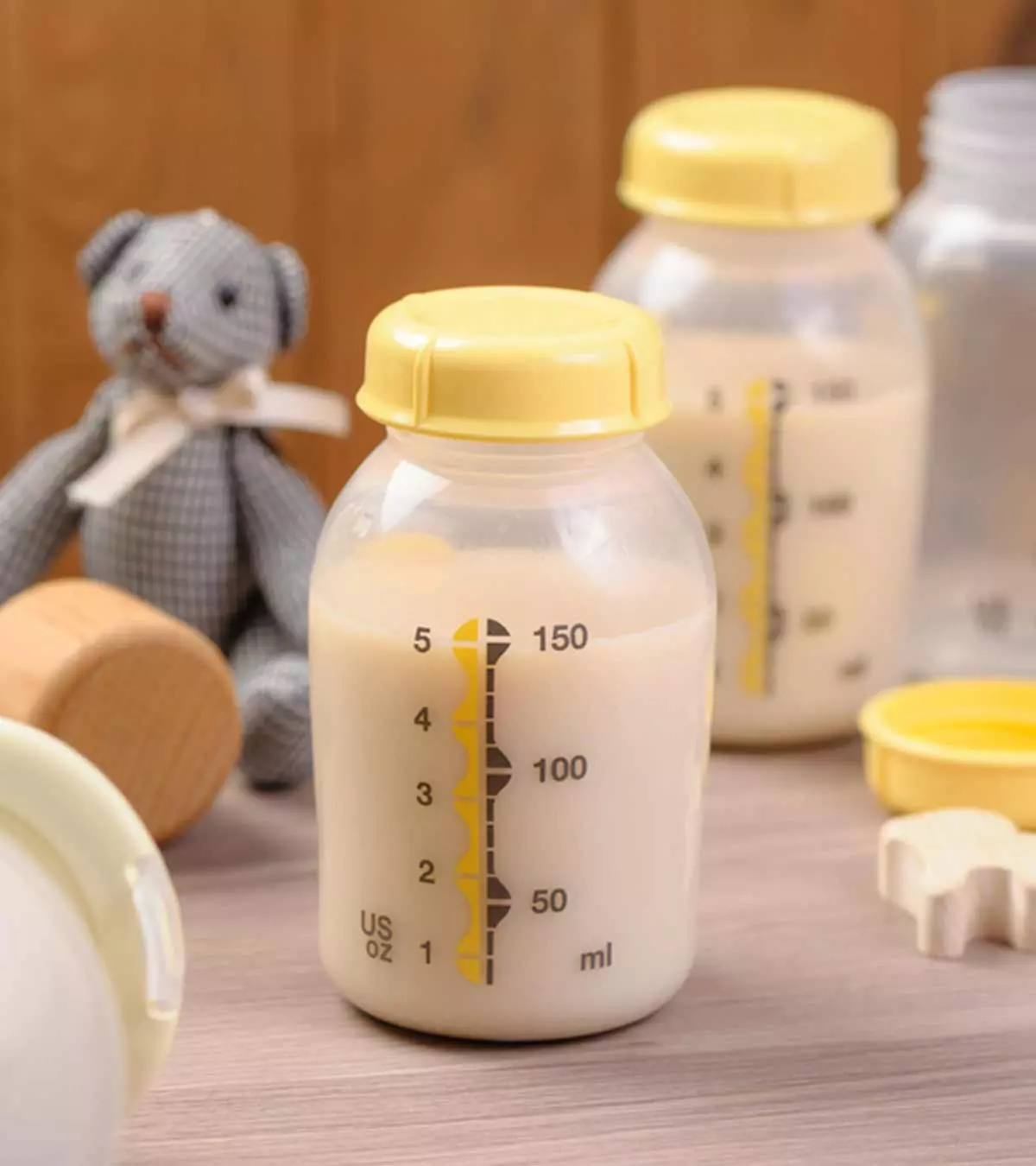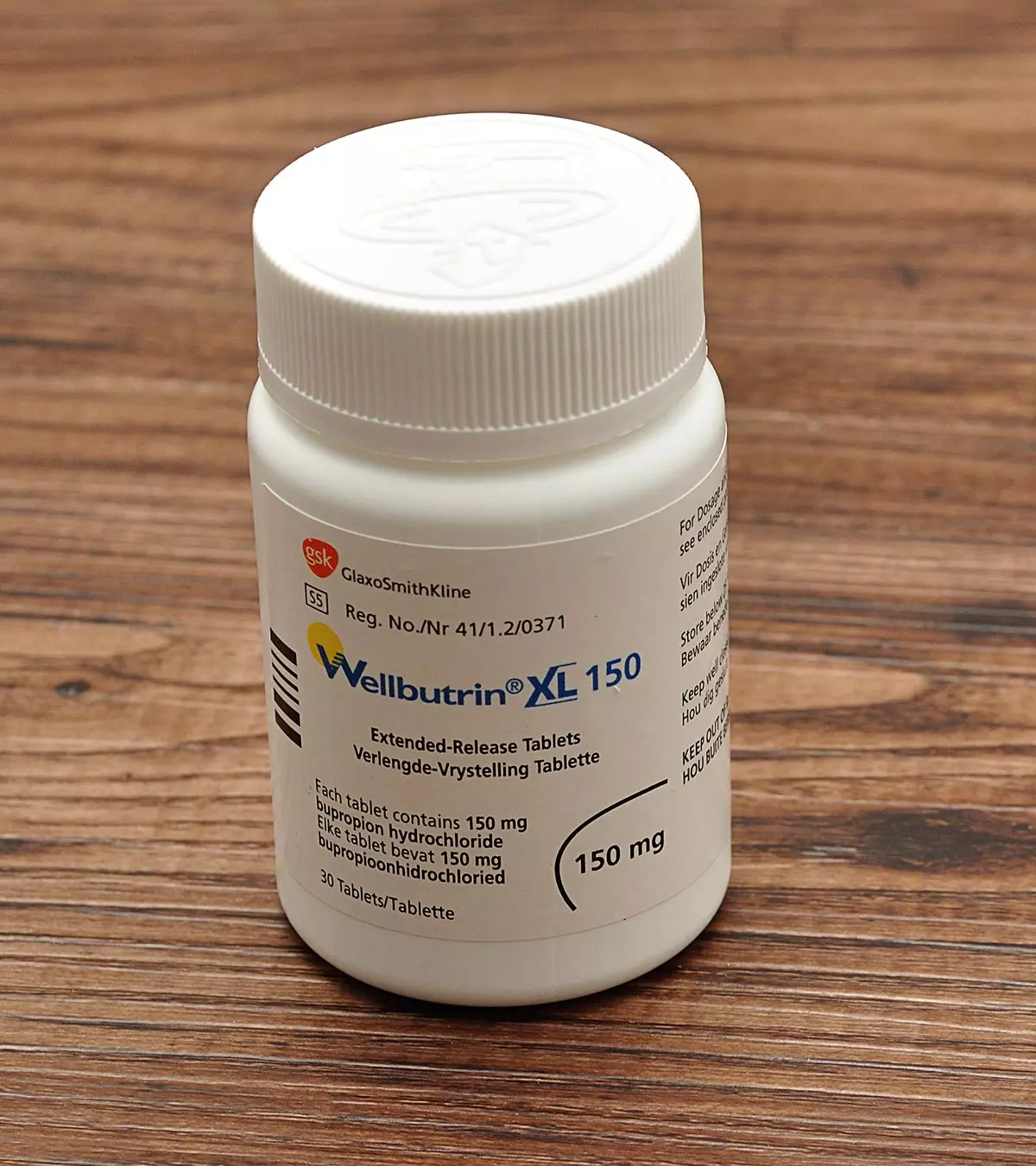
Image: ShutterStock
If you are experiencing dehydration when breastfeeding, it can change the composition and quantity of breast milk. Low water intake and fluid loss can deplete the fluid levels in the body. In such cases, nursing moms are more likely to develop dehydration due to increased fluid demand. Mild dehydration may not affect the milk supply, but it is important to prevent severe dehydration. You need to take more water during breastfeeding to maintain the body’s fluid levels and provide adequate nutrition through breast milk to your baby. Read on to learn the signs, causes, complications, and treatment of dehydration in breastfeeding mothers and ways to prevent it.
Key Pointers
- Dehydration during breastfeeding is often caused by chronic illnesses, high perspiration, and frequent vomiting and diarrhea.
- Severe dehydration during breastfeeding may impact the content and volume of breastmilk.
- Extreme thirst, headache, nausea, and muscle cramps are symptoms associated with dehydration.
- It is advised that lactating mothers drink 3.1 liters (13 cups) of water each day.
- Consuming foods high in water content, fluids, and avoiding too much caffeine can help prevent dehydration while breastfeeding.
Can Breastfeeding Cause Dehydration?
The reduced intake of fluids while breastfeeding may cause dehydration. Nursing mothers were found to lose an average of 700 ml of water a day by eight weeks postpartum (1). Thus, the Institute of Medicine (IOM) recommends that lactating mothers consume 3.1 liters (13 cups) of water daily, which can help manage water loss from breastfeeding (2). However, many studies indicate that breastfeeding women do not meet this requirement (15).
Make it a habit to drink a glass of water while nursing the baby, and have it after meals and other regular times. However, do note drinking extra fluids than the optimal requirement for postpartum hydration will not result in additional milk production. Therefore, if your thirst is quenched, then do not force yourself to drink more water.
 Expert says
Expert saysDoes Dehydration Affect Breastfeeding?
Severe dehydration may reduce milk production. However, this may not be a significant marker of dehydration while breastfeeding as other significant symptoms might surface even before the fall in milk supply. Usually, mothers seek medical care due to other symptoms and signs of dehydration before the reduction in the amount of breast milk.
Although exclusively breastfeeding mothers should consume additional fluids to maintain optimal hydration status, breastfed babies do not require extra water for hydration since 87% of breast milk is composed of water (1). Recommended formula feeds also meet the recommended fluid requirement to maintain optimum infant hydration.
What Are The Signs & Symptoms Of Dehydration When Breastfeeding?

The signs and symptoms may vary depending on the severity. You may experience a range of symptoms from an increase in thirst to confusion. However, being thirsty is usually the first sign of dehydration, followed by darker urine than usual (16).
The following signs and symptoms can be associated with dehydration (3):
- Extreme thirst
- Headache
- Nausea
- Dry mouth and lips (chapped lips)
- Dark urine and oliguria (decreased urine output)
- Constipation
- Tiredness or fatigue
- Dizziness
- Muscle cramps
- Confusion
- Rapid breaths and heart rate
- Hypotension (low blood pressure)
After a nursing session, dehydration may worsen, and a reduction in milk supply may lead to changes in infant feeding patterns, which can increase the risk of dehydration in your baby. Babies can become dehydrated sooner than adults.
Reflecting on her experience with dehydration during breastfeeding, Bailey Newman, a mother and vlogger, says, “When you are breastfeeding, you need to be drinking a lot of water. In the beginning, breastfeeding didn’t make me dehydrated. Yet, on one occasion, I was dehydrated to the point like I had the worst headache ever, I was very nauseous, all of the symptoms that you can feel from dehydration, I was feeling (i).”
You may consume more fluids and continue to breastfeed even when you are having diarrhea, vomiting, chronic illness, etc.
What Are The Risks And Causes Of Dehydration During Lactation?

Any health condition that causes water loss from the body and reduced intake of fluids could cause dehydration in nursing mothers. The following factors could increase the risk or cause dehydration while breastfeeding (4).
- Excessive sweating due to climate, physical activity, or fever
- Continuous vomiting
- Diarrhea
- Common cold or flu
- Diabetes insipid us and other chronic diseases
Sometimes, dehydration can also cause breast engorgement. When a mother is dehydrated, their body may hold onto fluids to prevent further dehydration. This can cause the breast tissue and milk ducts to become congested, leading to engorgement (17).
Lactating mothers require more daily water intake than other women, and this may speed up dehydration. Hot and humid environments, not drinking enough water, and lack of clean water supply could also increase the risk of dehydration in nursing mothers.
Most of the conditions listed above could result in fluid and electrolyte loss from the body. Although mild dehydration can be corrected by drinking water, moderate and severe dehydration requires medical care.
Does Dehydration Affect The Baby?
Maternal dehydration may also cause dehydration in the baby. Breastfed babies can develop hypernatremic dehydration (also known as extreme hydration), which is a high serum sodium concentration in the blood due to reduced fluids, which may result in severe complications if effective treatments are not given on time (5).
When To Visit A Doctor?

Seek medical care immediately if you have symptoms of severe dehydration, including (16):
- Fainting
- Muscle cramps
- Headache
- Confusion
- Drowsiness
- Weak or rapid pulse rate
- No urination for more than 8 hours
You may require rehydration with intravenous fluids in a hospital setting. Seek immediate care if you have signs of dehydration along with vaginal bleeding in the postpartum period.
Early medical care can help avoid complications. Talk to your doctor if you have mild dehydration, continuous vomiting, or diarrhea while breastfeeding. Do not use over-the-counter rehydration solutions without your doctor’s advice.
How To Manage Dehydration When Nursing?

Your doctor may start rehydration therapy after assessing symptoms and physical examination. Blood tests and urine tests are often ordered for confirmation and to identify the level of electrolyte loss (18).
Rehydration therapy is the treatment for dehydration. It is the replacement of lost electrolytes and fluids from the body (6). The intensity of rehydration therapy is decided depending on the fluid loss. Mild dehydration can be corrected with oral rehydration solutions.
Severe dehydration requires intravenous (IV) fluid correction to hydrate. Most people recover quickly after dehydration treatments. Your doctor may also prescribe medications to treat the underlying cause, such as diarrhea or vomiting. Taking oral rehydration solutions (ORS) or electrolyte powders without doctor’s advice is not recommended to prevent dehydration.
If your breastfed baby is dehydrated, then they will also receive rehydration therapy in the emergency room.
How To Prevent Dehydration During Breastfeeding?
Sometimes, new mothers forget to drink adequate fluids while putting the needs of little ones above theirs. However, you need to stay hydrated while breastfeeding to ensure yours and your little one’s good health.
The following tips may help reduce the incidence of dehydration in lactating mothers.
- Make sure you have a full water bottle nearby to drink throughout the day. Always keep clean and safe water handy. Purified water and bottled water can reduce the chance of water-borne diseases.
- If you often forget to drink water, then set an alarm or use some hydration apps to remind you.
- Drink water before and after feeding the baby and after your meals.
- Consume high water content foods, such as yogurt, soups, salads, cucumbers, watermelon, etc. These foods may help you stay hydrated without adding a lot of extra calories.

- You may add lemon juice or a small amount of fruit juice to make water more palatable.
- If you have trouble drinking lots of water in one go, take small sips of water throughout the day or suck on ice chips (18).
- Proactively drink more water and other hydrating fruits in hot weather, or if you’re sick, vomiting, or have diarrhea (16).
- Avoid caffeinated and sugary drinks, such as coffee, soda, or tea. These may cause dehydration due to diuretic effects (7).
 Did you know?
Did you know?Frequently Asked Questions
1. Can breastfeeding cause electrolyte imbalance?
Your body uses water for breast milk production and during the milk let-down reflex. Hence, you may get dehydrated if you don’t drink enough water. When the water balance in the body is disturbed, it affects the electrolyte balance (8). Thus, a breastfeeding mother will likely experience symptoms of electrolyte imbalance when dehydrated.
2. Does drinking more water increase breast milk?
Drinking sufficient water may improve your breast milk supply when you are dehydrated. However, drinking more water doesn’t generally improve a mother’s breast milk production (9).
3. Does drinking cold water affect breast milk production?
According to experts, heat encourages milk flow, whereas cold therapy reduces milk flow (10). However, this principle doesn’t apply to the water you drink. Thus, there’s no relationship between water temperature and breast milk production.
4. Can I breastfeed when dehydrated?
Generally, severe dehydration due to breastfeeding is rare. In most cases, mild maternal dehydration is treatable with sufficient water intake, and mothers can continue breastfeeding their babies. However, in cases of severe dehydration, mothers should speak to a lactation consultant or doctor to check if they can continue breastfeeding.
You may experience immense weakness and tiredness due to dehydration when breastfeeding. If you have been trying to avoid breastfeeding to reduce dehydration, you must know that it’s not a sustainable way of taking care of it. It is essential to consume a regular amount of water daily. However, if you continue to experience dehydration, you must consult a lactation expert. Ensure that you and your baby get the correct nourishment and stay hydrated. You can examine your hydration level by observing the color of the urine.
Infographic: Tips On Preventing Dehydration In Breastfeeding Mothers
It is important for breastfeeding mothers to monitor their hydration levels and drink plenty of fluids to avoid dehydration. If you experience the symptoms of dehydration, seek prompt medical attention. The following infographic offers tips for preventing dehydration in lactating women. Read on! Illustration: Momjunction Design Team
Illustration: Dehydration And Breastfeeding: Symptoms Causes & Treatment

Image: Dall·E/MomJunction Design Team
As a breastfeeding mom, it’s important to stay hydrated. Learn the top signs of dehydration and how to stay healthy!
Personal Experience: Source
MomJunction articles include first-hand experiences to provide you with better insights through real-life narratives. Here are the sources of personal accounts referenced in this article.
i. I was super dehydrated – New mom and breastfeeding struggle; day in the life.https://www.youtube.com/watch?feature=shared&v=Kg-q7M4OPE0
References
1. SaptawatiBardosono, et al.,Fluid Intake of Pregnant and Breastfeeding Women in Indonesia: A Cross-Sectional Survey with a Seven-Day Fluid Specific Record; The United States National Library of Medicine
2. Infancy; University of Hawaii
3. Dehydration; The United States National Library of Medicine
4. Water-a vital nutrient;Betterhealth; Victoria State Government
5. Suzanne Boeret al.,Evidence Based Weighing Policy During the First Week to Prevent Neonatal Hypernatremic Dehydration While Breastfeeding; The United States National Library of Medicine
6. Treating Cholera; Centers for Disease Control and Prevention
7. Maternal Diet and Breastfeeding; Centers for Disease Control and Prevention
8. Fluid and Electrolyte Balance;The United States National Library of Medicine
9. Chizoma M Ndikom et al.; Extra fluids for breastfeeding mothers for increasing milk production; NCBI
10. Lactation Suppression: (things that slow down or stop milk production)& Donation of Breastmilk; CHOC
11. Nutrition Guidance For Breastfeeding Women; University of Utah Health/cite>
12. Nursing Your Baby? What You Eat and Drink Matters; Academy of Nutrition and Dietetics.
13. Signs of Dehydration in Infants & Children; American Academy of Pediatrics.
14. 6 factors that won’t decrease your breast milk supply; The University of Texas Southwestern Medical Center.
15. Olga Malisova et al.; Investigating Water Balance as a Nutritional Determinant in Breastfeeding: A Comparative Study of Water Consumption Patterns and Influencing Factors; Nutrients; NCBI
16. Dehydration: signs, causes, and tips to drink more water; British Heart Foundation
17. What is Engorgement of Breast: Causes, Symptoms and Treatment; Pretty Mama Breastfeeding LLC
18. Dehydration; Medline Plus; National Library of Medicine
Community Experiences
Join the conversation and become a part of our nurturing community! Share your stories, experiences, and insights to connect with fellow parents.
Read full bio of Rebecca Koyf
Read full bio of Dr Bisny T. Joseph
Read full bio of Rohit Garoo
Read full bio of Shinta Liz Sunny





 Be watchful
Be watchful













